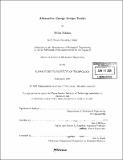Alternative energy design toolkit
Author(s)
Sukkasi, Sittha
DownloadFull printable version (18.56Mb)
Other Contributors
Massachusetts Institute of Technology. Dept. of Mechanical Engineering.
Advisor
David Wallace.
Terms of use
Metadata
Show full item recordAbstract
This thesis concerns the concepts, structure, and applications of the Alternative Energy Design Toolkit. The toolkit is aimed to provide a widely accessible, easy to use, flexible, yet powerful modeling environment for assisting design associated with renewable energy technologies. Exchanges of ideas and knowledge among the users are also highly encouraged and facilitated. The toolkit is composed of three important components: a collection of models that are fundamentals of renewable energy design, a modeling environment called DOME, which is used as the toolkit's enabler, and a supporting Web site. At the beginning, a comprehensive survey of existing tools for renewable energy design is presented. Then, the detailed descriptions and key capabilities of the toolkit's components are provided. In addition, a collection of solar energy models, which is the initial set of models in the toolkit, is also presented. The toolkit is utilized in two design scenarios: a design of a stand-alone PV system, and a trade-off analysis of a hybrid PV-diesel electricity system. In both design scenarios, the models in the toolkit are proven to be useful and convenient resources. The processes of making the representations of the systems are straight-forward, and the analysis mechanisms that the toolkit provides make the design process simple yet effective.
Description
Thesis (S.M.)--Massachusetts Institute of Technology, Dept. of Mechanical Engineering, 2004. Includes bibliographical references (p. 122-127).
Date issued
2004Department
Massachusetts Institute of Technology. Department of Mechanical EngineeringPublisher
Massachusetts Institute of Technology
Keywords
Mechanical Engineering.